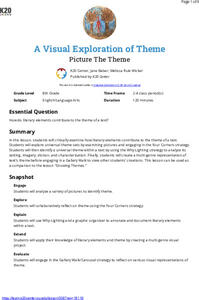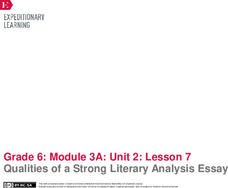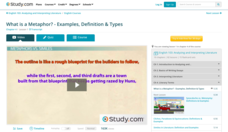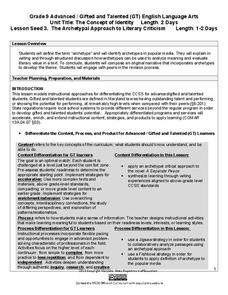Curated OER
A P Literary Terms
Is a list of literary terms found frequently on AP English exams of value to test takers? Now there's a rhetorical question. Here's a list that provides definitions for everything from allegory to vernacular. To say the list is...
Curated OER
Magical Musical Tour: Using Music Lyrics to Teach Literary Elements
While music lyrics are often used to teach literary elements, the richness of this resource comes from the wealth of exercises, activities, and support materials provided in the packet. Although designed for gifted learners, the...
Curated OER
What is Theme?
What is theme, and how can you find themes in literary works? These and other questions are answered by a colorful and engaging presentation that not only defines the term but also provides easy to understand examples. The slides...
K20 LEARN
From Apples To Oranges: Examining Literary Devices
Make learning the definitions of literary terms memorable with a fun and engaging activity. Teams of scholars are given several terms and create an acrostic poem with simplified definitions and examples.
Curated OER
Allusion and Illusion: Definitions and Examples
Illusions and allusions certainly sound similar but there is a world of difference in their meanings. The narrator of this short video distinguishes between these terms, defines them, and offers examples that are sure to engage viewers....
K20 LEARN
Analyzing Literary Figures: Analyzing Literature
The author study gets an update in a research project designed for high schoolers. Scholars search for information about literary figures that connects them to their times, their works, their themes, and other writers. Researchers also...
Curated OER
Synecdoche vs. Metonymy: Definitions
Ask your class to lend their ears, and eyes, to a short video that defines and offers examples of synecdoche and metonymy. Whether it be brand names like Kleenex® and Band-aids® that have come to stand for all the products in a category,...
Curated OER
Cliches, Paradoxes
Clichés, paradoxes, and equivocations are detailed in a short, animated video that defines and illustrates these writing traps. The resource also includes a quiz and the transcript for the video. Users can register to access free course...
District 186 Springfield Public Schools
Tone, Mood, Theme, and Motif
It's all well and good when you're asked to identify a speaker's tone using his or her body language, facial expression, and pitch and emphasis. Identifying the tone of a written passage is another challenge entirely. Check out an...
National Endowment for the Humanities
Themes in Lord of the Flies
William Golding's Lord of the Flies is the anchor text for a lesson that teaches readers how to distinguish between a literary topic and a literary theme. Using the provided worksheets, groups first chart some themes and propose a...
K20 LEARN
A Visual Exploration Of Theme: Picture The Theme
"What is the theme of this story?" Now there's a question that can strike fear in the hearts of learners. Here's a lesson that uses photographs to introduce the concept of theme. Scholars examine six photographs and then attach a theme...
Livaudais-Baker English Classroom
Background to Othello
Provide readers of Othello with information that will support their study of Shakespeare's tragedy. The 36 slides include background information about the themes, plot, characters, setting, and literary terms and devices used.
EngageNY
Qualities of a Strong Literary Analysis Essay
Read like a writer. Scholars read a model literary analysis in preparation for a similar writing assignment before annotating each paragraph for the gist. Next, pupils devise a list of qualities of a strong literary analysis essay.
McGraw Hill
Reading Strategies and Literary Elements
Introduce your freshmen to reading comprehension strategies and key literary elements with a year's worth of lessons and exercises. Each lesson focuses on a specific literary device and includes a definition of the term, a passage that...
Curated OER
What is a Metaphor? - Examples, Definition & Types
Metaphors, the definition of, types of, and examples of, are the subject of a short video that models for viewers this grand poobah of literary terms. Colorful images and animations are used to illustrate the connections between...
Curated OER
Types of Irony: Examples & Definitions
Isn’t it ironic that many situations labeled ironic aren’t? Properly labeled examples of verbal, dramatic, and situation irony are defined and illustrated in a short, animated video that uses passages from literary works as models. The...
Olathe Public Schools
Topic, Main Idea, Supporting Detail, and Theme
Get your class members thinking about a reading passage's topic, main idea, supporting details, and theme with this interactive presentation that asks scholars to define, locate, and review each term.
EngageNY
Planning for Writing: Introduction and Conclusion of a Literary Analysis Essay
First and last impressions are important. Using the helpful resource, scholars draft the introductory and concluding paragraphs of their literary analysis essays. Next, they use a writing evaluation rubric to self-assess their work.
EngageNY
End of Unit 2 Assessment: Final Literary Analysis
Get ready to review and revise! Scholars peer edit each other's literary analysis essay drafts. Next, using peer and teacher feedback, pupils compose their final drafts.
Maryland Department of Education
The Concept of Identity Lesson 3: The Archetypal Approach to Literary Criticism
As class members continue their study of approaches to literary criticism, readers examine the symbolism and archetypal patterns in John Knowles' A Separate Peace, and how these parallels are used to develop a theme...
Owl Teacher
Introduction to World Geography
Give your learners a thorough overview of what they will learn when studying geography, from the five themes of geography (location, place, environment, movement, and regions) to the tools of a geographer and parts of a map.
Curated OER
Poetic Elements
Poetry is all about sound and rhythm. The sound of the words, the rhythm of the lines, and the emotional atmosphere created by these elements and the literary devices poets use, compress whole stories into a few stanzas. The specialized...
Geography 360°
Poetry Writing
Put the tips and tricks in this guide into practice in order to encourage your pupils to blossom into poets. A wonderful reference material for teachers, this packet includes definitions of poetic terms and forms as well as step-by-step...
Simon & Schuster
Classroom Activities for The Odyssey by Homer
A 15-page packet details three activities designed to engage scholars in Homer's The Odyssey. As they read, pupils use a graphic organizer to record examples of several literary terms found in The Odyssey and contemporary...
Other popular searches
- Literary Terms Quiz
- Poetry and Literary Terms
- Smart Board Literary Terms
- Short Story Literary Terms
- Literary Terms Games
- Drama Literary Terms
- Literary Terms Review
- Nonfiction Literary Terms
- Literary Terms Rubric
- Literary Terms Vocabulary
- Literary Terms/devices
- Literary Terms Game Setting























